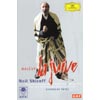Halévy (La) Juive
Can you really stage a spectacular opera with just the bare necessities?
View record and artist detailsRecord and Artist Details
Composer or Director: (Jacques-François-)Fromental(-Elie) Halévy
Genre:
DVD
Label: Deutsche Grammophon
Magazine Review Date: 2/2005
Media Format: Digital Versatile Disc
Media Runtime: 176
Mastering:
Stereo
Catalogue Number: 073 4001GH2

Tracks:
| Composition | Artist Credit |
|---|---|
| (La) Juive |
(Jacques-François-)Fromental(-Elie) Halévy, Composer
(Jacques-François-)Fromental(-Elie) Halévy, Composer Daniel Boaz, Ruggiero, Baritone Janusz Monarcha, Albert, Bass Jianyi Zhang, Prince Leopold Krassimira Stoyanova, Rachel, Soprano Neil Shicoff, Eleázar, Tenor Simina Ivan, Princess Eudoxie Vienna State Opera Chorus Vienna State Opera Orchestra Vjeksolav Sutej, Conductor Walter Fink, Cardinal de Brogni, Bass |
Author: John Steane
At the Paris Opéra in 1835, La Juive was regarded as a work which ‘required the most sumptuous and detailed reproduction of medieval life’. At the Vienna State Opera in 1999, when this film was made, it was seen as an opportunity for a production ‘rich in symbolism’.
Gone is the town centre of Constance, the ‘jardins magnifiques’, the gothic apartment, the large pavilion and tiered amphitheatre; and in their place is, essentially, nothing. At least the front stage, which serves sometimes for Eléazar’s shop, is divided from the larger, raised area (bare and colourless), with, between them, a sloping walkway on which the singers try to move as if they don’t notice it. The chorus seem not to notice anything, acting like people who have been told to stand here, form up there and wave little flags till the music stops. Duets take place with one character on the upper level and the other several feet below. But that no doubt is richly symbolical; it just looks silly.
Of course, we could close our eyes and listen, but we don’t buy DVDs to do that. Besides, there is always the possibility that there may be some well-acted individual performances. The opera usually centres on the character of Eléazar, the devout, troubled, vengeful Jew. It does so here, with Neil Shicoff acting as a lonely, preoccupied figure, one who has strayed into the world of grand opera from a production of something (Incident at Vichy, perhaps) by Arthur Miller. His singing wins the audience, with an ovation after ‘Rachel, quand du Seigneur’, though it hasn’t the tonal beauty of Richard Tucker or the concentrated line-drawing of Giovanni Martinelli. In any case, the title-role is feminine. Krassimira Stoyanova is a Rachel of real quality, radiant and powerful of voice, gifted with a dignified presence, and carrying as much dramatic conviction as this particularly tiresome production allows. Walter Fink’s sonorous bass and authoritative manner are memorable too.
The orchestra plays well and Vjekoslav Sutej conducts like one who is in the habit of listening to his singers. Eléazar’s cabaletta, ‘Dieu m’éclaire‘ and the Ballet are omitted. Sound quality is fine. Günter Krämer’s production has been admired and exported. Personally, I would stay with the sound recording on Philips (Julia Varady and José Carreras in the leading roles, Almeida conducting – 11/89) and hope that one day a stage producer with a feeling for grand opera might find out more about that Paris production and then discover a wealthy sponsor.
Gone is the town centre of Constance, the ‘jardins magnifiques’, the gothic apartment, the large pavilion and tiered amphitheatre; and in their place is, essentially, nothing. At least the front stage, which serves sometimes for Eléazar’s shop, is divided from the larger, raised area (bare and colourless), with, between them, a sloping walkway on which the singers try to move as if they don’t notice it. The chorus seem not to notice anything, acting like people who have been told to stand here, form up there and wave little flags till the music stops. Duets take place with one character on the upper level and the other several feet below. But that no doubt is richly symbolical; it just looks silly.
Of course, we could close our eyes and listen, but we don’t buy DVDs to do that. Besides, there is always the possibility that there may be some well-acted individual performances. The opera usually centres on the character of Eléazar, the devout, troubled, vengeful Jew. It does so here, with Neil Shicoff acting as a lonely, preoccupied figure, one who has strayed into the world of grand opera from a production of something (Incident at Vichy, perhaps) by Arthur Miller. His singing wins the audience, with an ovation after ‘Rachel, quand du Seigneur’, though it hasn’t the tonal beauty of Richard Tucker or the concentrated line-drawing of Giovanni Martinelli. In any case, the title-role is feminine. Krassimira Stoyanova is a Rachel of real quality, radiant and powerful of voice, gifted with a dignified presence, and carrying as much dramatic conviction as this particularly tiresome production allows. Walter Fink’s sonorous bass and authoritative manner are memorable too.
The orchestra plays well and Vjekoslav Sutej conducts like one who is in the habit of listening to his singers. Eléazar’s cabaletta, ‘Dieu m’éclaire‘ and the Ballet are omitted. Sound quality is fine. Günter Krämer’s production has been admired and exported. Personally, I would stay with the sound recording on Philips (Julia Varady and José Carreras in the leading roles, Almeida conducting – 11/89) and hope that one day a stage producer with a feeling for grand opera might find out more about that Paris production and then discover a wealthy sponsor.
Explore the world’s largest classical music catalogue on Apple Music Classical.
Included with an Apple Music subscription. Download now.

Gramophone Digital Club
- Digital Edition
- Digital Archive
- Reviews Database
- Events & Offers
From £9.20 / month
Subscribe
Gramophone Club
- Print Edition
- Digital Edition
- Digital Archive
- Reviews Database
- Events & Offers
From £11.45 / month
Subscribe
If you are a library, university or other organisation that would be interested in an institutional subscription to Gramophone please click here for further information.






